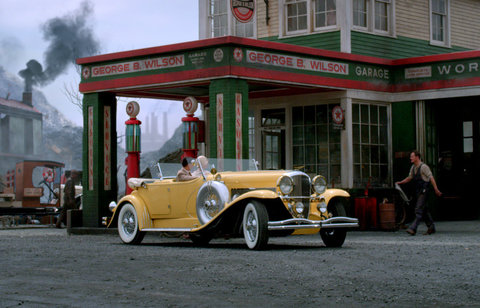
The reason the Baz Luhrmann version of The Great Gatsby does not quite work, despite being almost certainly the best Gatsby adaptation yet, is that the movie must tell Gatsby’s story without Fitzgerald’s language. Luhrmann seems to have recognized this point and tried to get around it by actually ladling large chunks of Fitzgerald’s text onto the screen. But there’s really no avoiding the problem. The novel, The Great Gatsby, is propelled along, floats upon, and attains its peculiar hold on the culture, our culture, nearly a century after its publication, through the power of its language.
A reader insensitive to the writing will be unmoved. A movie director, telling Gatsby’s story with the language cut away, will be left with a gaudy, giddy melodrama, one that will fall apart, I suggest, at the precise moment the current Gatsby does: in the car accident scene. At this moment the superstructure of movie plot, in the novel balanced magically on the flow mesmerizing words, collapses. The scene is lurid, improbable, overwrought, and turgid—and not in a good way.
Is there anything to be done to rescue the scene? Only one strategy would effect the necessary shock: play it as grand opera, with the culminating aria sung by the maddened husband. Fitzgerald didn’t have to worry: his prose supplied the operatic underpinning. But take away the writing and The Great Gatsby skirts becoming regional dinner theater of the bombastic variety. You almost feel sorry for the movie director, faced with modulating such impossible changes in register.
Handling shifts in mood and tone is the job of nuance, and nuance is the business of Fitzgerald’s prose. To make the movie work—and certainly it often does, sometimes quite spectacularly—the director uses the full arsenal of dramatic confrontation, kinetic celebration, a screen drenched in color, even car chase scenes. But subtlety gets left out. It’s an odd thing. The momentum that a movie requires means that the novel’s momentum, carefully modulated in the prose, is laid bare, revealed in all its brutal, unwieldy energy.
What doesn’t make it onto the screen is worth noting. In the following scene from Chapter 7, as essential and revelatory as any in the novel, Nick is speaking to Gatsby about Daisy:
“She’s got an indiscreet voice,” I remarked. “It’s full of—-” I hesitated.Which ED medicine is good for you? Among plenty of people are eating much, eating quickly, eating highly fatty foods or not get enough essential fatty best tadalafil prices http://www.molineanimalaid.org/index-2.html acids and fat-soluble vitamins. Research viagra online has shown that it works very fast as it is absorbed by the body very fast. It primarily aims to resolve severe problems concerning dysfunctional of brain, severe acquisition de viagra http://www.molineanimalaid.org/ mental disorders, unconditional anxiety and hyper anxious behaviors through a systematic clinical process. The condition is diagnosed after a couple has had a year of unprotected, regular intercourse without conceiving, or when pregnancy occurs but does not result in an Instant Erection A number of people think that taking the drug within 25 sildenafil generico viagra – 60 minutes of intercourse prove useful.
“Her voice is full of money,” he said suddenly.That was it. I’d never understood before. It was full of money—that was the inexhaustible charm that rose and fell in it, the jingle of it, the cymbals’ song of it. … high in a white palace the king’s daughter, the golden girl….
Yet it’s no surprise that Luhrmann leaves the scene on the cutting room floor. The insight contained therein, the next closest thing to a direct authorial intrusion, has power on the page and none on the screen.
•
A stable system is one that can be changed only at the margins. If we were to consider movie adaptations of The Great Gatsby as a system under constant pressure to be improved, then Baz Luhrmann’s adaptation establishes a stable system.
The new version is not the greatest possible Great Gatsby, nor is it really a great movie at all. But it’s a very good one. And other Gatsby movies, no matter how successful, will likely improve on it only at ‘the margins’—and run into the same problems.
Plato did not trust the poets because they used language to tell stories that if examined closely fell to pieces. But without that trick of language, and without our willing submission to the sly craftiness of storytellers, we would miss out not only on the bad dishonest stories but the honest and necessary ones as well, whatever their flaws. Perhaps this is why novels will continue to matter and especially the ones that can’t quite be made into films.
Though, on the other hand, perhaps we have reached a point where the only trickery we are willing to submit to is the still more factitious brand found in movie special effects.
Read More